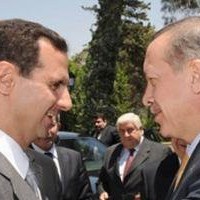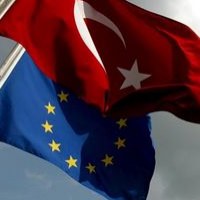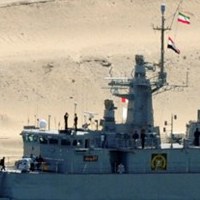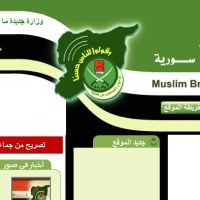![]()
Thu, Oct 14, 2010 | The Rubin Report | By Barry Rubin
Iran-Syria Bloc Consolidates Alliance With Turkish Regime
Here’s one more in a whole series of Iranian and Syrian statements that Turkey–which means the current Islamist-oriented regime in Ankara–is now a strategic ally of these two radical states.
Question: Can you be simultaneously an ally of the United States and an ally of Iran? Sounds hard to pull off, doesn’t it?
Syrian President Bashar al-Assad added Lebanon, which is now close to being an Iran-Syria satellite, and–perhaps based on wishful thinking–Jordan to that list. The statement came during meetings he held with Turkish Prime Minister Erdogan during the latter’s visit to Damascus and the first meeting of the Syrian-Turkish High Level Strategic Cooperation Council during which 51 agreements for cooperation were signed.
Meanwhile, Iranian President Mahmoud Ahmadinejad visited Lebanon. As he visits the Lebanon-Israel border, Iranian President Mahmoud Ahmadinejad is making a statement that he is the leader of the Arab world. After all, Ahmadinejad has to overcome two problems: one is that he’s Persian; the other is that he’s a Shia Muslim. Iran has been making a lot of progress on these fronts though it still faces powerful limits to exerting influence in the Arabic-speaking world.
In effect, Ahmadinejad is saying: I insult America! I am leader of the Palestinian struggle! I’m going to get nuclear weapons! I’ve got it all!
Fortunately, while he’s playing to the mob he’s also enraging all the leaders he seeks to displace. And the Iranians in general aren’t too thrilled either as the economic situation there continues to decline since sanctions are biting.
Now, if there was only some Western leadership to organize the other side there might be more hope of defeating the Iranian and Islamist forces.
Speaking about Iran, it is becoming fashionable now for some to claim that Iran is merely a paper tiger. Yes, it is true that in a direct battle with the United States the Iranian military would certainly lose. Yes, it is equally true that Iran is not about to invade other countries the way North Korea did South Korea in 1950 or Iraq did to Kuwait in 1990. Iran might even be successfully deterred from firing nuclear-tipped missiles at Israel.
But that is not the nature of this long struggle. Remember that during the Cold War–a period of almost 45 years–the Soviet Union, which was far stronger than Iran of course–never directly engaged in battle with the United States, nor did either side fire missiles at the other. The struggle was conducted covertly, through proxies, by way of ideological recruiting, in a competition to gain allies or to install allied (or puppet) regimes.
That is the nature of this struggle. And on these terms Iran is winning. It has made gains in Lebanon, Gaza, to a lesser extent in Iraq, and to a small extent in Afghanistan. Tehran has won as allies the regimes in Syria and Turkey.
What gains has the United States made against the Iran-Syria-Hizballah-Hamas axis in the last two years? Quite the contrary, according to a remarkable column in the Qatari newspaper al-Arab that has been translated by MEMRI. It is so remarkable–and reflects what a lot of influential Arabs are saying privately–that I can’t resist quoting a chunk of it:
“Reviewing the Arab reality, we find that president [Bush’s policies] corresponded to those of the moderate [Arab] camp on most strategic issues… Bush portrayed some of the [Arab] countries [mainly Syria: BR] as traitor states belonging to the Axis of Evil. This position was an anchor that the moderate states relied on in addressing regional issues, a position that strengthened them vis-à-vis Iran, Syria and their proxies – Hizbullah and Hamas. President Bush’s positions helped to [increase] the influence of the moderate camp in the Middle East, and to isolate Syria for a few years. They created a new situation in Lebanon, and to a certain extent forced Hamas to negotiate with the leaders of Saudi Arabia, Jordan and Egypt. Bush was serious in settling scores with Syria, and he understood the Shi’ite threat, which the leaders of the [moderate] Arab countries have long been concerned about. He did not hesitate to put the resistance [radical: BR] movements on the West’s list of terrorist [organizations].
“[Looking at] Obama, on the other hand, we find that he has mishandled the affairs of the Middle East in two ways. His first [mistake] is his openness towards Iran and Syria, which Americans view as exonerating evil [regimes] that have not stopped supporting terrorism and threatening America’s interests in the Middle East. The moderate Arabs view this step as ingratitude towards them after all they have done for the U.S., which should have strengthened them in the region vis-à-vis their rivals [instead of reaching out to the latter]. The second [mistake] of the new America president is that, unlike his predecessor, he does not issue clear instructions to the leaders of the Middle East countries–which has caused some, even among his allies, to rebel against him, as it were. [For example,] Fatah’s threats to withdraw from the U.S.-sponsored negotiations [with Israel] have become a commonplace phenomenon… Israel [too] sees Obama as a weak president who cannot fulfill [the needs] of the Hebrew state, even though he has promised to protect it from any danger…”
If you were a fly on the wall at a meeting of Saudi, Egyptian, Jordanian, moderate Lebanese, and lots of other Arabic-speaking leaders, this is precisely what you’d be hearing.
About the author,
Barry Rubin is director of the Global Research in International Affairs (GLORIA) Center and editor of the Middle East Review of International Affairs (MERIA) Journal. His latest books are The Israel-Arab Reader (seventh edition), The Long War for Freedom: The Arab Struggle for Democracy in the Middle East (Wiley), and The Truth About Syria (Palgrave-Macmillan). For the website of the GLORIA Center go here and for his blog, Rubin Reports, go here.



 RSS
RSS











Iran-Syria Bloc Consolidates Alliance With Turkish Regime | #israel #syria #iran #turkey #lebanon http://j.mp/btENtH
RT @CrethiPlethi: Iran-Syria Bloc Consolidates Alliance With Turkish Regime | #israel #syria #iran #turkey #lebanon http://j.mp/btENtH
[…] read this companion article I’ve written very carefully, then click on the link and read what the Qatari author wrote. […]